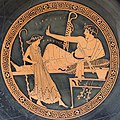 I never thought I’d see the day when I’d put both the International Monetary Fund (IMF) and Irish legal education together in the title of a blogpost. But there it is, above. And this is because the summary of the the Joint EU-IMF Programme for Ireland on the Department of the Taoiseach website suggests that there will be consequences for legal education:
I never thought I’d see the day when I’d put both the International Monetary Fund (IMF) and Irish legal education together in the title of a blogpost. But there it is, above. And this is because the summary of the the Joint EU-IMF Programme for Ireland on the Department of the Taoiseach website suggests that there will be consequences for legal education:
Competition
Removal of restrictions to competition in sheltered sectors including:
Legal profession:
– establish an independent regulator;
– implement the recommendations of the Legal Costs Working Group and outstanding Competition Authority recommendations. …
The enhancement of competition and the reduction of regulation in sheltered sectors is a standard IMF prescription, so this recommendation comes as little surprise. As for its details, the Legal Costs Working Group was established in 2004 and asked to look at the way in which legal costs are determined and assessed, and it reported in 2005 (pdf). In December 2006, as part of a series of reports on regulated professions, the Competition Authority published a Report on the Legal Professions which determined that the legal profession was in need of substantial reform. …





